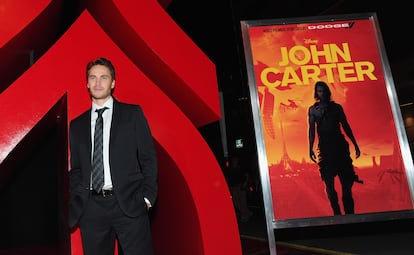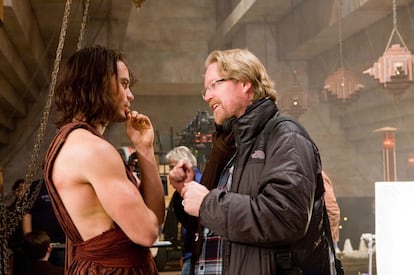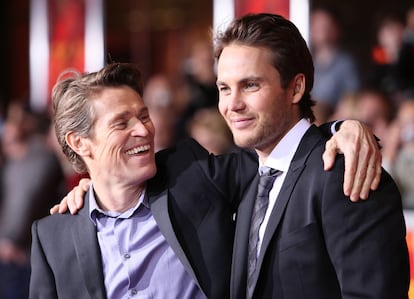A decade on, Disney’s ‘John Carter’ is still remembered for one of the worst marketing campaigns in movie history
Based on a classic novel by Edgar R. Burroughs, helmed by Pixar’s golden boy and with a script by a Pulitzer-winning writer, the film seemed destined for success. Instead it tanked

If you were to ask someone where they were on March 11, 2012, it is unlikely the answer would be “at the movies watching John Carter.” If they said that they were, they would have been one of precious few viewers giving Disney something to smile about. The hit the studio took on the movie has been estimated at $200 million by CNN, turning what was going to be the box-office smash of the year into one of Disney’s biggest flops.
The funny thing is, the reasons for its failure were not the standard ones. It was not a production beset by financial problems and filming setbacks like Waterworld in 1995; neither was there a clash of egos as between Marlon Brando and Val Kilmer on the 1996 The Island of Dr. Moreau, nor the piles of whiskey and cocaine that sunk Robert Altman’s Popeye in 1980. Quite the opposite in fact: the problem with John Carter was the excessive leeway given to its director and the laxity of inexperienced executives. But then, who was going to rein in director Andrew Stanton, one of Disney’s prized assets after the smash hits WALL-E and Finding Nemo? Nobody wanted to ruffle the feathers of Pixar’s golden egg-laying goose.
The issues started with the concept. What Disney saw as a blockbuster destined to launch a new galactic saga – two sequels were already planned – was for Stanton the culmination of a lifelong dream. He approached the project as though it was Batman without taking into account that the vast majority of moviegoers had never heard of John Carter. “He could see no idea in which someone didn’t know who John Carter of Mars was. But it’s not Frankenstein; it’s not Sherlock Holmes. Nobody cares. People don’t say, ‘I know what I’ll be for Halloween! I’ll be John Carter!’” one of the movie’s marketing executives told Vulture magazine.

The character of John Carter was created by Edgar Rice Burroughs as a US Confederate Army captain who dies and is reborn on Mars (styled by Burroughs as Barsoom) where two warring cities are vying for control of the planet and where Carter falls in love with a Martian princess. The movie is based on Burroughs’ novel A Princess of Mars, published in 1912, and the John Carter series has influenced almost every science fiction franchise since then. Star Wars would be inconceivable without John Carter – a desert planet, a gunslinger and a princess he falls for: sounds familiar? Swap a desert planet for a leafy one and you have Avatar. Neither George Lucas nor James Cameron have ever denied that Burroughs’ work was essential to their movies. Which begs the question: how could the novel that inspired two of the biggest box-office successes of all time fail to inspire itself?
An 80-year wait
The adventures of John Carter had been bouncing around the offices of Hollywood executives since the 1930s. At that time, Looney Tunes director Bob Clampett pitched the idea of an animated movie to Burroughs, but it never came together. Neither did a subsequent idea from the hand of animation maestro Ray Harryhausen. It wasn’t until the 1990s when it became closer to becoming reality with John McTiernan, who directed Die Hard, Tom Cruise and Julia Roberts lined up, but the technical difficulty of the project saw McTiernan shelve it in favor of Last Action Hero, which didn’t exactly set the box office alight, either. Roberts also forgot about the idea, but Cruise retained his interest.
After McTiernan, the project was picked up and dropped first by Robert Rodríguez and then by Jon Favreau, who instead opted for Iron Man. Eventually, it reached Andrew Stanton. “That’s something I have spent my whole life wishing somebody would make, and when I was in the industry from maybe the ‘90s on, if I ever heard even the slightest rumor it might get made, I would get all excited like a fanboy and go, ‘I’ll be the first in line to go and see it,’” Stanton told The Wrap. “I never had the hubris to think that’s something I would want to do or could do.”
With Stanton on board to direct, attention turned to the leads, a part of the process that can often be the hardest but for Stanton was simple: he was convinced that the Canadian model and actor Taylor Kitsch, who had starred as football player Tim Riggins in Friday Night Lights and played Gambit on X-Men Origins: Wolverine, was the physical incarnation of John Carter. But the shadow of Tom Cruise still hung over the project. It is easy to imagine Disney rubbing their hands together at the prospect of a franchise with Cruise as its lead, but Stanton had complete control. “I had Taylor already in mind by the time Tom made his interest known. Tom had a long history with the material, so it wasn’t too surprising to discover he still had interest in it,” Stanton told The Wrap. “We agreed to talk further if I were to pass on Taylor, but I obviously didn’t. It was as simple and non-controversial as that.”

Lynn Collins, who had worked with Kitsch on X-Men, was chosen to play the princess, Dejah Thoris. Neither lead was a huge star in their own right but they were backed by a stellar cast including Willem Dafoe, Samantha Morton and Bryan Cranston. And Pulitzer Prize-winner Michael Chabon, a fan of Burroughs’ novels just like Stanton, was brought in to write the script.
With the cast settled and production underway the problems started to emerge, starting with the movie’s title. The logical choice would have been A Princess of Mars, but Stanton believed that with that title “not a single boy” would go to the movie theater. He favored John Carter of Mars – the last book in Burroughs’ series – but Disney’s marketing executive, MT Carney, who was new to the industry and had no previous experience with cinema, decided there had been too many recent movies with Mars in the title that had flopped (Mission to Mars and Red Planet in 2000 and Mars Needs Moms in 2011). As such, Carney decided the movie would be called simply John Carter. “That was first moment, I was like, ‘Oh, fuck. This is not good. We may be in trouble here,’” Chabon told The Wrap. “From that meeting until it came out, it was not good after that.”
The next bad decision came from Stanton, who decided not to include any references to his Pixar success in the teaser trailer, so people would not associate the movie as being aimed at a younger audience. Neither was there mention of Burroughs, or Chabon, who was at the zenith of his popularity at the time. No powerful sequences were included and neither was Woola, Carter’s Martian dog, “the most distinctive visual element of the movie,” according to Vulture, a potential baby Yoda for the production.
Stanton still believed the movie would be successful based on the name alone, but nobody knew who John Carter was, at least not the millions of moviegoers that would have been necessary to justify the production budget. “This is one of the worst marketing campaigns in the history of movies,” a former Disney executive told Vulture. “It’s almost as if they went out of their way to not make us care.”
“The way the cookie crumbles”
When the movie premiered in February 2012, its stars were the only people unaware that it had already failed. It was not their fault, it wasn’t even that the public had not liked the movie. Simply put, nobody could be bothered to go watch it. Recalling her walk down the red carpet, Collins told The Wrap that Kitsch whispered to her: ‘It’s going to be a fucking disaster.’ Collins’ agent told her she would be blamed. “You’re just going to have to disappear because you’re the one who’s going to get the heat for this. This is just the way the cookie crumbles. Usually that’s what happens.” Fortunately for Collins that was not the case. All of the criticism was leveled at the marketing campaign, carried out by inexperienced executives who swiftly disappeared from Disney.
The movie had a budget of $250 million but took only $30 million on its opening weekend, less than half of what would have been considered a minimally acceptable outcome. Stanton was largely unscathed by John Carter: his next production, Finding Dory, grossed over $1 billion worldwide. Kitsch would suffer again with his next big project, Battleship. Collins, whose performance received warm reviews, found refuge in television, and she sacked her agent.
Ten years after its release, John Carter is still considered a monumental failure, but not a terrible movie. “John Carter may not be a perfect movie, but it’s one where you can safely plunk down your money, grab your box of popcorn and come away reasonably satisfied when the closing credits roll,” wrote critic Charlie McCollum after its release. Time has proven him right to an extent: the movie’s inclusion on Netflix’s catalog a couple of years ago has reignited interest in Carter’s adventures, and a first video game based on the character is in production. Perhaps one day those sequels will get made after all.
Tu suscripción se está usando en otro dispositivo
¿Quieres añadir otro usuario a tu suscripción?
Si continúas leyendo en este dispositivo, no se podrá leer en el otro.
FlechaTu suscripción se está usando en otro dispositivo y solo puedes acceder a EL PAÍS desde un dispositivo a la vez.
Si quieres compartir tu cuenta, cambia tu suscripción a la modalidad Premium, así podrás añadir otro usuario. Cada uno accederá con su propia cuenta de email, lo que os permitirá personalizar vuestra experiencia en EL PAÍS.
¿Tienes una suscripción de empresa? Accede aquí para contratar más cuentas.
En el caso de no saber quién está usando tu cuenta, te recomendamos cambiar tu contraseña aquí.
Si decides continuar compartiendo tu cuenta, este mensaje se mostrará en tu dispositivo y en el de la otra persona que está usando tu cuenta de forma indefinida, afectando a tu experiencia de lectura. Puedes consultar aquí los términos y condiciones de la suscripción digital.









































